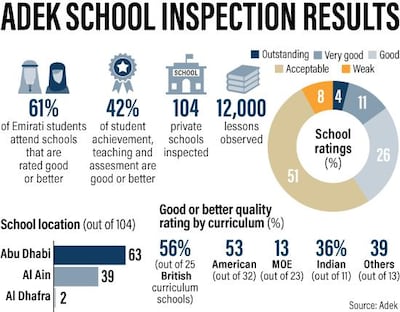Four Abu Dhabi schools were rated outstanding and one in three institutions have improved, government inspections revealed.
The majority of 104 private schools assessed by the emirate's Department of Education and Knowledge maintained or improved their standards over the past two years.
The Irtiqa’a Inspection Report – the result of school visits carried out every two years – found that 34 per cent of schools had improved since the previous inspection, with just 5 per cent dropping in performance.
In Abu Dhabi, Al Muna Primary School, Raha International School and Merryland International School were rated outstanding, as was Brighton College in Al Ain.
None of the 86 schools inspected last year had received the top ranking in the Adek report.
In the latest report, 12 schools were rated very good, 27 were ranked good, 53 received an acceptable mark and eight were found to be weak.
Schools are judged in several categories, including pupils' achievement, personal and social development, innovation skills, teaching and assessment and leadership and management of the school, with inspections lasting between three and five days.
This year’s results found that 42 per cent of schools provided good quality for pupil achievement and teaching and assessment, whereas 51 per cent provided acceptable quality and only 7 per cent were weak.
Forty-nine per cent of schools were found to have good leadership and management, 43 per cent had acceptable leadership and only 8 percent showed weak leadership.
Kathryn Simms, vice principal and head of secondary at Raha International School, said the school achieved an outstanding score in all key areas and marks were raised in many categories.
“There is a true partnership between leadership, parents, staff and pupils that allows for truly great learning and progress within the school,” she said. “Everybody in the school is committed to being lifelong learners, from our cleaners and security to classroom teachers and senior leadership. The inspectors also noted that.”
Iain Colledge, principal at Raha International School, said he joined the school two years ago, after it had just received its first outstanding rating from Adek.
“I wanted to continue the school’s improvement beyond its label of ‘outstanding’,” he said.
“Through gathering input from parents, staff, pupils and teachers, the leadership team was able to distill 10 guiding statements to transcend inspection frameworks and develop a school that is truly exceptional.
“Titled ‘Raha’s Exceptional Journey’, the initiative is a permanent and lifelong journey and vision for ensuring continued excellence and for providing services and education beyond the regular school remit.
“These guiding statements are displayed all around the school as a constant reminder of the journey beyond outstanding.”
________________
Read more:
Adek inspections reveal drop in failing schools in Abu Dhabi
Abu Dhabi schools to have less warning ahead of Adek inspections
Adec announces weak private schools banned from registering new pupils
________________
Jeff Evans, from Learning Key Education Consultancy, said the results showed “significant improvement, which reflects almost 10 years of rigorous external inspection”.
He said that schools are reaping the rewards of investments made in staff development and resources.
Judith Finnemore, an independent education consultant in Al Ain, said the Ministry of Education curriculum showed signs of improvement, especially in the past couple of years, but many schools need to invest in their staff if they are to progress further and must be more innovative in their teaching methods.
“The difficulties lie in recruiting teachers who are creative and innovative in how they deliver those curricula,” Ms Finnemore said.
“There is still a predisposition to lecturing, rote learning and knocking textbooks into the heads of students.
“It comes down to teacher training. Many teachers teach the same way they were taught and this isn’t working. Teacher shortages mean some schools take on teachers who are not well matched to the specific curriculum, so they deliver it in a generic manner.
“In the Ministry of Education sector, I suspect some of the poor ratings come down to the salaries they can afford to offer. Teachers who are on low salaries do not have the incentive to put in extra hours or make better resources to make the curriculum come alive.”
She said having a “common salary” scale for teachers could help to incentivise staff and drive up standards even further.
“Have a common salary scale for teachers. If they all pass the same licence standard, this is only fair. They all live in the UAE and have the same expenses.
“This might be an incentive for the lower-paid teachers to put more time and effort into their work.
“Many undertake private tuition to supplement their salaries and they are just plain tired.”
She believes authorities should consider conducting annual inspections for schools rated acceptable and below to accelerate a rise in standards.
“The two-year gap means a year of polishing up and a year of breathing out. This cycle does no favours for driving up standards. Look at all that Dubai has achieved in its inspection results. It has made an enormous difference.”
Private school inspections in Abu Dhabi started in 2008 and the first school inspections were held between 2009 and 2011.



